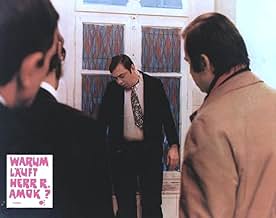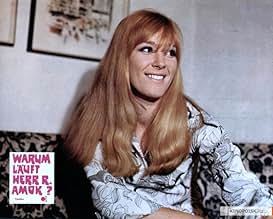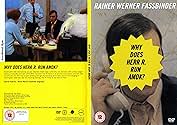Pourquoi monsieur R. est-il atteint de folie meurtrière?
Ajouter une intrigue dans votre langueWith slicked-down hair and three-piece suits, dependable Herr Raab is a technical draftsman. He gets along with his colleagues although his boss wants him to go beyond technical cleanliness ... Tout lireWith slicked-down hair and three-piece suits, dependable Herr Raab is a technical draftsman. He gets along with his colleagues although his boss wants him to go beyond technical cleanliness to problem solving. He's a dutiful husband; his wife's a social climber and pushes him to ... Tout lireWith slicked-down hair and three-piece suits, dependable Herr Raab is a technical draftsman. He gets along with his colleagues although his boss wants him to go beyond technical cleanliness to problem solving. He's a dutiful husband; his wife's a social climber and pushes him to seek a promotion, but they also share sweet moments. He's a caring father, helping his son... Tout lire
- Réalisation
- Scénario
- Casting principal
- Récompenses
- 3 victoires et 2 nominations au total
- Kollege im Büro
- (as Harry Bär)
- Opa Raab
- (as Herr Sterr)
- Oma Raab
- (as Frau Sterr)
- Schallplattenverkäuferin
- (as Carla Aulaulu)
Avis à la une
Another problem, perhaps in a certain perspective even more delicate, is the border between a deed in thought and a deed in fact. Many people kill others in their wishes, dreams, they even say it without meaning it. On the other hand, some people would never say it, but then there is a moment when they do it. What is it that causes the transgression between thought and deed? R.W. Fassbinder presents a fully uncommented, non-condemnatory approach in "Warum Läuft Herr R. Amok?" (1970). Up to a certain degree, the absolute free speech which gives the illusion of everyday-conversations observed by a candid camera, has the form of a Brechtian "Lehrstück", however, there is no wagging finger to sense in this movie. The spectator is elevated into the position of the judge - if he really still thinks that the deed of Herr R. can be judged after having watched and understood the movie. The spectator even becomes a part of the movie, without him the communication scheme is incomplete. He is the receiver of a message from whom not even an answer is expected, but a revision in thinking on the basis of which has been presented to him. "A good movie is a movie that does not stop when people come out of the cinema, but continues in their heads", Fassbinder said once.
The film consists largely of lengthy conversations about the most mundane of things; work, vacations, the son's school, buying a romantic record in a music store... The whole picture is also presented exclusively with long takes and hand-held cameras. The improvised nature of the conversations further adds to the strictly realist documentary-like feel of the movie, as does the intentionally dull cinematography. With such undramatic direction, the only detail to suggest the advancement of Mr. R.'s emotional alienation is Kurt Raab's subtle performance: Mr. R. alternates between sullen observing and unrestrained blabbing, and when the camera occasionally focuses on his face instead of his chit-chatting friends, one can get a creepy feel of slowly escalating anxiety inside him. Lilith Ungerer as his wife also displays faint hints of similar emotions, but keeps them tightly hidden under her shell of excruciating normalcy.
When a film is titled like this one, some kind of dramatic ending or plot twist can be expected sooner or later. Here it only happens at the very end; until the last 10 minutes or so, the film is completely G-rated. The scene preceding the twist is the best one in the whole film and achieves a very distressing atmosphere, but still, the twist itself comes across as rather predictable and even lackluster. Perhaps it is just that modern audiences have become desensitized to such incidents, but more oomph would have been needed to justify the preceding 80 minutes of practically nothing, as Mr. R.'s boredom has also become ours by the end.
Even though there's not much to see besides the lead couple's performance, I have a taste for this type of uneventful, talky cinema. Ultimately Warum... was a curious novelty to me and kept me intrigued throughout, but I'm somewhat wary of recommending it to more casual film fans; something like Michael Haneke's 71 Fragments of a Chronology of Chance could be a more easily accessible take on the subject. Then again, if you know what to expect, Warum... may also be a rewarding experience in mundanity that many can surely identify with – you have to make up your own mind based on your tastes.
Because, frankly, this isn't like the Fassbinder you would be used to after seeing, for example, the BDR trilogy or Fear Eats the Soul. It's as if Fassbinder and/or Fengler contracted Al Maysles to follow an 'average' middle-class German family, the father and architect and the wife a, uh, house-wife I guess, with an 'average' child. The style of dialog is improvisation, and the camera-work reflects this with the "cienema verite" approach. Indeed there may be only about 30 actual shots in the whole film; it's a series of long takes as the DP, Dietrich Lohmann, goes around a room and zooms in or out based on a feeling here or there or something that may be of interest (such as the desperation Herr R tries his best to hide in most scenes).
What happens with this style, for better or worse, is that we get into the daily grind, the mundane conversations in a living room or in a car (i.e. car repairs), a trip to the school for a talk with the teacher about the kid, or a trip to the not-totally sympathetic doctor, or the embarrassing toast that Herr R makes in front of his co-workers and boss. There is the mundane, and its so much that one starts to get into this mood. There is a drawback if one isn't ready/willing/able to be in this style; not a lot "happens" in the film until, of course, the frighteningly sudden climax of the "Amok" part of the title. Indeed there's something to this that draws in the audience with the characters; there's a scene where Herr R, his wife, their son and a couple of friends are walking along on a road, and it goes on for so long (both the shot and the slow walk) we, as well as the parents, don't realize that the son has gone off on his own and don't know where he ventured off.
Herr R. is an emotional story, but it's a little hard to penetrate. But for those who are patient and attentive there are some great rewards. One of these is Kurt Raab's performance (who, by the way, is also called Mr. Raab in the film, which adds to the confusion of whether this is documentary or fiction, or both at the same time); it's a performance that is tricky but works very well, full of subtlety and restraint, eyes darting carefully and physical expressions to the dot meant with importance. The performance is improvised, but there's nothing I can see that wasn't thought through to be on the screen by Fassbinder and/or Fengler. And it's this character, if nothing else, that marks it as the indicator of it being from RW; it's about the alienation of an outsider, someone in such a mundane world, so "normal" that there is barely any expression of individuality, of anything outside of a "norm" being seen as anything except quiet (or not so quiet) scorn. This is set up from the start with the characters telling the jokes, and Herr R's going flat with everyone else.
It's basically a super-low budget experiment in reality-as-drama, about the emptiness of a class system that allows people to live comfortably and with some semblance of peace, but also a form of life that can be shattered so easily and with such terror. The ending, indeed, can only be really comparable to the likes of Haneke's Cache for its random, existential impact. The more one lets Herr R in, the more this world is horrible and cruel and desperate. Not the brightest of times to have, but worthwhile all the same.
From the beginning he is simply not there, as Patrick Bateman would put it. When his colleagues make jokes, he walks with them, but not laughs with them. When his wife brings a friend, we see his narrow-mindedness. She is self-assured and liberal with no clue of what to do with her life, something Kurt is unable to understand. He needs order. He is order. He trys to have everything perfect in his sense, he works technically perfect like a machine, but lacks (human) ideas, or tries to cure his son's speech problems, but he always fails.
His system of perfection does not work. He does not work. And it keeps going on. You see Kurt in different allday situations, where he doesn't behave (all too) strange in a obvious way. But watch him more carefully and you see that he's empty. He holds down all emotions. In a banal situation, when he sees that his life is not perfect at all, and unable to adjust his system to the others like he always was, he tries to make his life perfect by eliminating all disturbing factors. He runs amok. And he does so as he always did: Emotionless.
What Fassbinder wants to show us, is what lies beneath the human fassade. We never know what a person really thinks or feel, because we're all masters of disguise and on the other hand unable or unwilling to find out (another) one's real feelings. And that can be dangerous.
Here, in opposition to his more characteristically considered style, a shaky hand-held camera eavesdrops on the eponymous Herr R.(played to perfection by the great Kurt Raab) who is tediously seen at his work, with his wife, during a visit from his parents and the like, while slowly unwinding inside.
Long takes predominate and we are also let into the life of Herr R.'s pretty but equally vapid wife for whom he, in a most affecting scene, buys a record without knowing the singer or song title - much to the shameless merriment of the shop-girls who serve him. Fassbinder keeps the tension tightly wound throughout and it is this knowing sense of what to show and when to withhold that gives the greatest indication that this is the work of a man who was to become one of Europe's greatest film-makers since Ingmar Bergman.
No doubt, many will find the extreme sense of realism and boredom too oppressive but 'Herr R.' has proved to be highly influential on a much later generation of film-makers and still retains the power to provoke and unsettle.
Le saviez-vous
- AnecdotesIn 2003 on a interview for Village Voice Hanna Schygulla claimed that this film was completely done by director Michael Fengler, whereas purported co-director Rainer Werner Fassbinder had nothing to do with the actual film. She also claimed that film was almost completely improvised which wasn't Fassbinder's way to make movies. Fassbinder still is credited as director and writer on the actual film and on many official sources, including Fassbinder Foundation's website. This fact has been confirmed by Michael Fengler himself in the 2008 documentation Gegenschuss - Aufbruch der Filmemacher (2008). He reported, that Fassbinder was involved neither in writing nor in directing of the movie and has visited the movie set at most twice during shooting.
- GaffesWhen Herr R. leaves the doctor the camera team can be seen in the mirror on the wall.
- ConnexionsFeatured in Sehnsucht nach Sodom (1989)
Meilleurs choix
- How long is Why Does Herr R. Run Amok??Alimenté par Alexa
Détails
- Date de sortie
- Pays d’origine
- Langue
- Aussi connu sous le nom de
- Why Does Herr R. Run Amok?
- Lieux de tournage
- Müllerstraße 40, Munich, Bavière, Allemagne(bureau, Franz Maron, Architekt/Dipl. Ing.)
- Sociétés de production
- Voir plus de crédits d'entreprise sur IMDbPro
Box-office
- Budget
- 135 000 DEM (estimé)
- Durée1 heure 28 minutes
- Mixage
- Rapport de forme
- 1.37 : 1





























